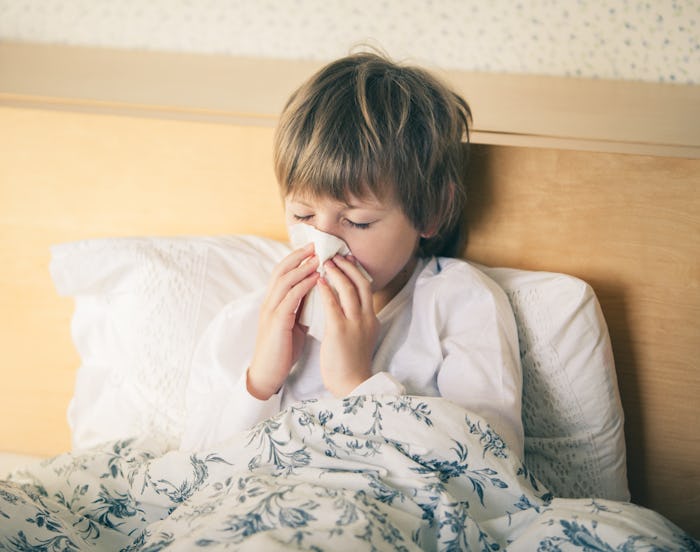News
Giving Decongestants To Kids With Colds May Cause More Harm Than Good, Experts Say
Keeping track of what is and isn't safe for sick kids can be pretty difficult. It might be easy to assume that kids can have just about any cold medicine out there, but research is showing that's not necessarily the case. According to a new study, giving decongestants to kids with colds may cause more harm than good, and here's why.
Listening to kids with stuffed noses can be a lot. Plus, anyone who has experienced a cold before will tell you that stuffed noses are no fun. You come to really treasure the days you didn't have to try breathing through your mouth.
Most adults have used decongestants at least once in their lives. They work pretty much how they sound: they help you breathe. As outlined by WebMD, decongestants help reduce swelling inside your nose, which helps alleviate the pressure you feel and boost your ability to breathe comfortably. They can come in a variety of forms, including pills and sprays.
Most decongestants are available without a prescription, as WebMD noted, and can easily be found over-the-counter. Considering how useful they can be for adults, you might assume that they work just as well for kids. But, it seems that giving kids decongestants may not actually benefit them at all.
For kids, there's no clear evidence that decongestants work at all, according to a report produced by the BMJ. In fact, research shows that giving kids decongestants can lead to mild or severe side effects, though many of those studies were small.
Researchers focused on the common cold. As noted by the BMJ, adults may have around two to four colds each year, but kids will typically see more, around six to eight. Generally, the common cold isn't a cause for alarm, as colds will often run their course within seven to 10 days.
The symptoms of a common cold can be really annoying, though. Researchers working on the study decided to focus their review on treatments for congestion, runny nose, and sneezing, since those were the most common symptom complaints, according to Reuters.
They ultimately found little evidence that many over-the-counter medications could help alleviate these sorts of symptoms - and instead, the drugs can actually have some side effects, as reported by Reuters.
"Do not prescribe decongestants to children under 12, as evidence of their effectiveness is limited and associated risks may exist," the researchers concluded, according to the BMJ.
Reported side effects of commonly-used remedies included headaches, sleepiness, nosebleeds, "GI symptoms", and more, according to the researcher team.
So, what else can you do?
The tough thing about the common cold is there's nothing to make it go away. As noted by the CDC, the only thing you can try to do is to make sure your children rest, hydrate, and treat their symptoms.
Instead of decongestants, many recommend clearing kids' noses with saline drops. In an interview with Health, Dr. Peter Cardiello, MD, said that just two or three drops per nostril dispensed while your child lies on their back can be helpful. Make sure to have them blow their nose afterwards.
Current research suggests that kids who receive a saline rinse recover from the cold or flu faster, just make sure you're rinsing correctly and not doing so too often.
Parents can also try some home remedies, like sitting in a bathroom with a hot shower running, which might help ease congestion due to the steam.
Dealing with colds can be frustrating, but there's no point in giving kids something that will only add to their discomfort. Talking to your child's doctor can help you determine how to handle things, but you may want to decongestants away and stick to other remedies instead.
